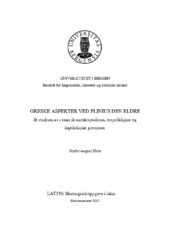| dc.description.abstract | The influence of Greek language and culture on the Roman world is difficult to underestimate, and the use of Greek borrowings into the Latin language was extensive in works of both poetry and prose. The results of this can be observed today with the many interspersed elements of Greek words and expressions in modern scientific and medical Latin. In this Master’s dissertation I investigate three aspects of the authorship of Pliny the Elder in relation to its Greek influence: First I discuss Pliny and other Roman encyclopedics in the context of linguistic interaction between the Greek and Roman literatures. Encyclopedism in antiquity has been proposed as a predominantly Roman phenomenon, and I discuss this along three main lines: The extensive works of translation from Greek sources in early Roman literature, named as the Roman translation project by Feeney (2016); Greek predecessors in encyclopedism from whom the Romans may have sought inspiration; and encyclopedism in the context of politics and the quest for cultural dominance in the Mediterranean. Then I investigate the use of Greek borrowings in a selected reading of book 20 of Pliny’s Natural History, building on Gitner’s (2012) dissertation on Greek borrowings in the works of Horace. Here I aim to illustrate how dependent Pliny is on his command of the Greek language to disseminate the knowledge of Greek medical sources in his work, and I categorize selected Greek borrowings in search for tendencies and conclusions to be made by the type of borrowings that are found. Lastly, I discuss Pliny’s role in the history of medicine, particularly regarding his nomenclature and the degree to which his choice of words have survived to this day. Pliny has been described as a predecessor to modern medical Latin with its extensive interspersions of Greek elements, and I discuss to what degree this is indeed the case. | en_US |
